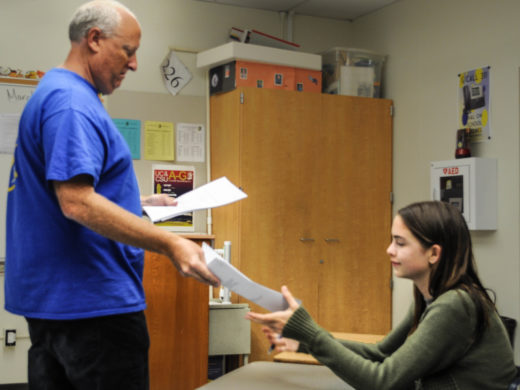
Online courses usually require students to meet at least once a week in class. Photo by John Le.by Anju Ito, Staff Writer
Beginning next year, Fountain Valley High School (FVHS) is adding three additional hybrid-online classes to their course options–precalculus, expository reading and writing course (ERWC) and physical education–in addition to the current health, U.S. history and English three classes.
In the hybrid-online courses, teachers conduct a mostly-online curriculum where they post assignments and videos for each day’s lesson on Canvas and students are required to complete them throughout the week. In addition to this online part, students need to also go into the classroom, usually one time per week, where they meet with the teacher and spend a physical period of class time together.
This year was the first time year the U.S. history and English three hybrid-online courses were offered at FVHS.
“I’ve learned to be much more flexible with students,” said Bryce Walker, the teacher of the hybrid-online course for U.S. history. “I’ve also learned that I can create relationships with the kids even though I see them only one day a week. I’ve met some great kids in class—kids that I’ve made a good connection with and I think they’ve made a connection with me also.”
Both U.S. history and English three class this year took place during fifth period which allowed students to go home early or have an extra 50 minutes that they can spend doing other things such as works from other classes, jobs or taking care of other responsibilities.
However, while having this privilege, hybrid-online classes can also be difficult to have for some students due to its increased need of self-motivation and planning that comes from an indirect online class.
“This is not a class for somebody who thinks it’s going to be easy, because it is not easy, it’s actually maybe a little harder,” said Walker. “[The students] need to create the time, set the time that they can accomplish the work and communicate with [their] online teacher as much as possible, either through email, through Canvas or coming in and talking to me because I’m available every day.”
In addition, hybrid-online class can also have an increased workload compared to normal classes because students need to understand everything that other people might be able to learn in classrooms on their own and teachers can also go through different curriculums for the online class.
“I’d say where the biggest major difference is is that my online class is more project-oriented than my regular class, so in class with my normal U.S. History classes, we’d do more direct instructions–we look at keynotes. We do activities in class. There’s more of an emphasis on discussion amongst themselves, whereas the online class, there are discussions, but it’s also more project-based rather than daily assignments and then taking an exam at the end,” said Walker.
Students can still sign up to the classes by completing an interest form mandated by the district that are then given to the guidance counselors who choose who will be in the class and who would not. Students can also talk to specific teachers for a more detailed insight and information of the courses. Currently, U.S. history is taught by Walker, English three by David Theriault and Health by Jason Kols. And next year’s new courses will be taught by Aaron Tyson for Precalculus, Doug Wilton for ERWC and Brad Woodbury for P.E..
“I’m excited about [the online class],” Wilton, teacher of next year’s online ERWC class said. “We’re hoping that it’ll kind of free up students of ours to manage their own schedules and do extracurricular things and be able to pick and choose when they do their schoolwork for the class. And I also think that it’s going to be a great preparation for students because most colleges now are offering online courses and I think it’ll help prepare some of our seniors into transitioning into the college environment and just to try it out to see if online or hybrid classes are right for them so they’ll know more in college.”
However, while the online courses provide many benefits and a great experience, Walker believes that this shouldn’t be the only choice that should be offered in high school and that there should be a limit to the number of online classes students can take. “High school is about learning how to be a good person, learning good work habits, socializing, having fun, going to events, not just doing your work and getting an A. There’s a lot more that high school provides and kids need to be here on campus. So even though it’s kind of the opposite of what online-hybrid is, I firmly believe that kids need to be here on campus for school.”





